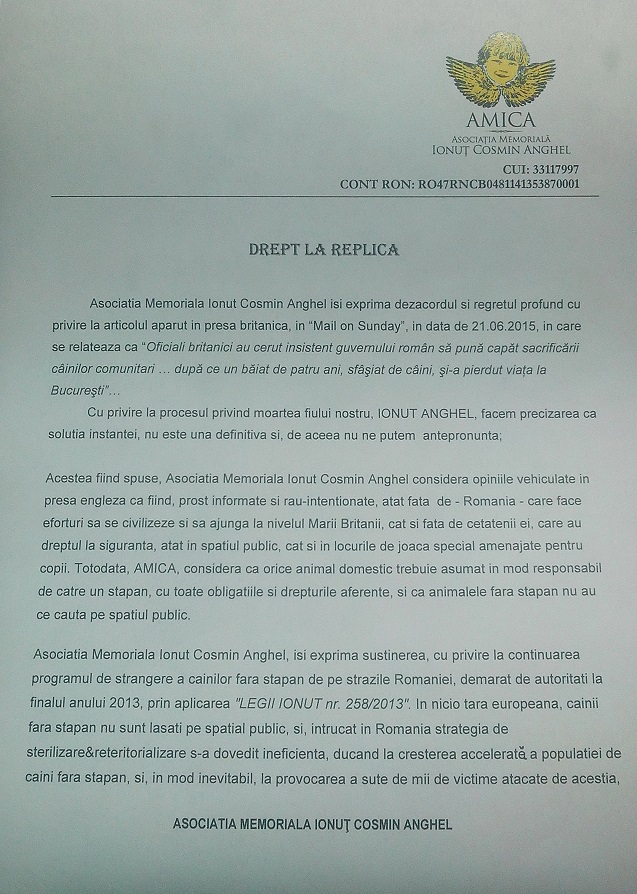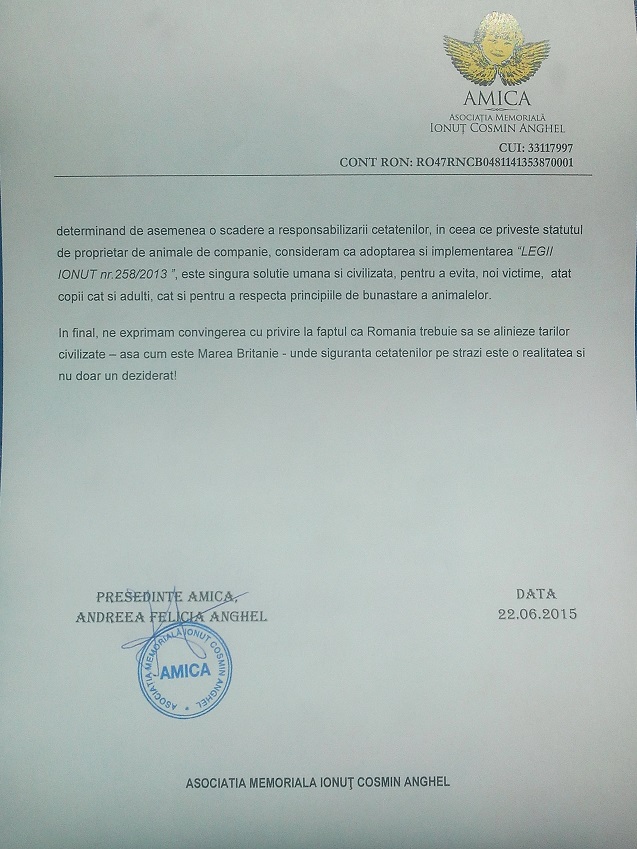Asociaţia Memorială Ionuţ Cosmin Anghel (AMICA ) a emis un comunicat de presă în care îşi exprimă dezacordul şi regretul profund cu privire la articolul apărut în presa britanică, în "Mail on Sunday".
Articol respectiv arăta că oficiali britanici au cerut insistent guvernului român să pună capăt "sacrificării" câinilor comunitari, după ce în jur de 300.000 dintre aceștia au fost omorâți în cadrul unei campanii de reducere a numărului patrupedelor fără stăpân declanșată după ce Ionuţ şi-a pierdut viaţa, sfâşiat de câini.
Mail on Sunday dezvăluie că oficiali britanici au făcut lobby pe lângă liderii de la București, solicitându-le să dea dovadă de un comportament "uman" în criza milioanelor de câini comunitari care colindă pe străzile din România, mușcând mii de persoane în fiecare an.
Familia lui Ionuţ Cosmin Anghel răspunde presei britanice şi face precizarea că soluţia instanţei în cazul morţii fiului lor nu este una definitivă şi în consecinţă nu se pot antepronunţa. De altfel, ei consideră că presa britanică este prost informată şi rău-intenţionată faţă de România.
Asociaţia Memorială Ionuţ Cosmin Anghel consideră opiniile vehiculate în presa engleză ca fiind, prost informate şi rău-intenţionate, atât faţă de România, care face eforturi să se civilizeze şi să ajungă la nivelul Marii Britanii, cât şi faţă de cetăţenii ei, care au dreptul la siguranţă, atât în spaţiul public, cât şi în locurile de joacă special amenajate pentru copii. Totodată, AMICA consideră că orice animal domestic trebuie asumat în mod responsabil de către stăpân, cu toate obligaţiile şi drepturile aferente, şi că animalele fără stăpân nu au ce căuta în spaţiul public"
În finalul comunicatului, familia lui Ionuţ Anghel îsi exprimă susţinerea faţă de decizia autorităţilor de a strânge câinii de pe stradă.
"Asociaţia Memorială Ionuţ Cosmin Anghel îşi exprimă susţinerea, cu privire la continuarea programului de strângere a căinilor fără stăpân de pe străzile României, demarat de autorităţi la finalul anului 2013, prin aplicarea Legii Ionuţ nr. 258/2013. În nicio ţară europeană, câinii fără stăpân nu sunt lăsaţi pe spaţiul public şi, întrucât în România strategia de sterilizare şi reteritorializare s-a dovedit ineficientă, ducând la creşterea accelerată a populaţiei de câini fără stăpân, şi, în mod inevitabil, la provocarea a sute de mii de victime atacate de aceştia, determinând, de asemenea, o scădere a responsabilizării cetăţenilor, în ceea ce priveşte statutul de proprietar de animale de companie, considerăm că adoptarea şi implementarea Legii Ionuţ, nr 258/2013, este singura soluţie umană şi civilizată, pentru a evita, noi victime, atât copii cât şi adulţi, cât şi pemtru a respecta principiile de bunăstarea a animalelor.", se mai arată în comunicatul AMICA.








Autentifică-te sau înregistrează-te pentru a trimite comentarii.
Pai daca ii vor asa de mult inglejii, sa vina sa si-i ia, si pe matale impreuna cu ei. Numai aveti grija, ca la ei dupa paishpe zile, bai-bai vorld. N-ai stapan, n-ai nici mau. Sau hau. Sau miau.
Intr-o tara civilizata o femeie IRESPONSABILA precum IMBECILA de bunica era in cel mai bun caz internata la ospiciu , asta daca nu zacea in inchisoare pentru neglijarea minorilor.
In orice tara civilizata orice parinte care nu-si supravegheaza copilul este decazut din drepturi.
Sunt parinte, si nu doresc raul nimanui, insa atentie fam anghel, Dumnezeu iti da dupa cum faci, si mai aveti un copil, sa nu cumva sa-ti intoarca fata de la voi si sa platiti pentru toata suferinta unor suflete care au o singura vina : cea ca exista , ca atunci degeaba milionari , POATE, in euro ca veti cumpara lumanari de ei.
http://adevarul.ro/locale/slobozia/povestea-batranului-condamnat-sa-si-duca-zilele-cerul-liber-au-venit-m-au-aruncat-strada-1_558aa6a56a5d00bc4e98e7ec/index.html doar un exemplu ....poate il ajutati voi ,acei iubitori de oameni
Spay/Neuter Facts
Spay/Neuter Facts & Myths
Question #1: What does “spay” and “neuter” mean?
Female dogs and cats are spayed by removing their reproductive organs, and male dogs and cats are neutered by removing their testicles. In both cases, the operation is performed while the pet is under anesthesia.
Question #2: Why should I spay or neuter my pet?
Spaying/neutering is the only way to eliminate pet overpopulation! Plus, it’s good for you, your pet and the community! More info on Pyometra and Mammary cancer.
Question #3: How is spaying/neutering good for the pet and the pet owner?
Spaying/neutering can lower vet bills! Fixed pets are less prone to a variety of diseases. Spayed females have a lower risk of breast cancer (90% fatal in cats and 50% fatal in dogs) and life-threatening uterine infections. Neutered males have no risk of testicular disease and a lower risk of prostate diseases. Plus, the cost to have your pet spayed or neutered at All About Animals’s low-cost spay/neuter clinic is a lot less then the cost to have and care for a litter or litters.
Spaying/neutering can lead to better pet behavior! A spayed female won’t go into heat which will prevent yowling, frequent urination and discharge. Neutered male dogs are usually better behaved and will not feel the need to mark their territory. A neutered male dog won’t be as inclined to roam in search of a mate; roaming animals can cause vehicular accidents and scare children.
Spaying/neutering can prevent fights between pets. Fights between pets can be serious, causing deep wounds and transmitting deadly diseases. Neutered males tend to be less aggressive to both animals and people, especially if neutered at an early age.
Question #4: How is spaying/neutering good for the community?
If more pets are spayed/neutered, there will be less stray, homeless, unwanted animals. Communities spend millions of dollars to control unwanted animals. Stray and roaming (a behavior associated with breeding) animals can cause dog bites and attacks. Stray and homeless animals get into trash containers, or defecate in public areas or on private lawns. Spaying/neutering prevents unwanted litters and keeps more animals off the streets and out of already overburdened animal shelters and rescue groups.
Question #5: When and how often can animals breed?
Female cats can breed three times a year and have an average of four kittens per litter. Dogs can breed twice a year and have an average of 6 – 10 puppies per litter. Female cats can breed as early as four months and dogs as early as six months!
Question #6: At what age is it safe to spay/neuter?
All About Animals will spay/neuter puppies and kittens when they’re 8 weeks old and at least 2 lbs (kittens) or 3 lbs (puppies). It’s a myth that you can’t spay/neuter kittens and puppies when they’re so young – they actually bounce back from spay/neuter surgery very quickly! Pediatric spay/neuter is safe and is less stressful on the animal than waiting until they’re older.
Question #7: I know I can find good homes for all the puppies/kittens – especially if they’re purebreds – so what’s the problem?
For every human born in the United States, 45 cats and 15 dogs will be born. Six to eight million dogs and cats are waiting in shelters across the country; 25% of shelter animals are purebreds. About half will be euthanized because there simply aren’t enough homes. Every home found for one of your pet’s offspring – purebred or not – takes a home away from a purebred or mixed breed dog or cat waiting in a shelter. And, in less than one year’s time, each of your pet’s offspring may have his or her own litter, contributing to the pet overpopulation problem even further. The problem of pet overpopulation is created and perpetuated one puppy/kitten and one litter at a time.
Question #8: Isn’t it better for my pet to have one litter before I get her spayed?
No, that’s a myth! Medical evidence shows that female pets that are spayed before their first heat are typically healthier in the long run.
Question #9: Will my pet get fat and lazy if she/he is spayed/neutered?
No, that’s a myth. Most pets get fat and lazy because they are overfed and/or don’t get enough exercise.
Question #10: Isn’t it a good idea for my children to experience the “miracle of birth?”
By allowing your pet to give birth, you are contributing to pet overpopulation (please refer to question/answer #7 for more information). Explain to your children that preventing the birth of some pets can save the lives of others and consider fostering a pregnant animal from a shelter or rescue group if you still feel they need to see the “miracle of birth.”
Question #11: Will spaying/neutering make my dog less “protective” or make my male pet feel like “less” of a male?
Spaying/ neutering does not affect a pet’s natural instinct to protect the home and the family, and pets don’t have any concept of sexual identity or ego. A pet’s personality is formed more by genetics and his environment than by sex hormones so neutering will not change a pet’s basic personality or make him suffer any kind of emotional reaction or identity crisis.
Question #12: My dog/cat is so special! Doesn’t it make sense to want a puppy/kitten just like her?
A dog or cat may be a great pet and family member, but that doesn’t mean his/her offspring will be a carbon copy! Professional animal breeders who follow generations of bloodlines can’t guarantee they will get just what they want out of a particular litter. A pet owner’s chances are even slimmer. In fact, an entire litter of puppies or kittens might get all of a pet’s (and/or her mate’s) worst characteristics!
Question #13: What if I can’t afford the cost to have my pet spayed/neutered?
AAAR can help! We are a non-profit, low-cost spay/neuter clinic. We serve pet owners, feral/stray cat caretakers, animal shelters and rescue groups. We serve all area pet owners and we offer a special, even lower rate to people on federal assistance programs. If a person cannot afford even our low-cost price, we work with them to determine what they can afford and reduce our price to that amount so that no pet parent is ever turned away due to cost.
The cost to have your pet spayed/neutered is a one-time cost that is much less expensive than the cost to have and care for a litter or litters. Plus, the health and behavioral benefits to your pet will save on veterinary bills and training/behaviorist fees
Ionut Anghel n-a fost cauza adoptarii acestei legi, ci doar scanteia. Oamenii se mobilizasera pe net inca de la moartea copilului Sami Tcaciuc. Semnalul aparuse odata cu decesul omului de afaceri japonez, decedat in fata guvernului. Candva trebuia sa se intample, pentru ca devenise de nesuportat. Paharul era plin, Ionut a fost doar picatura care l-a umplut. Oricum ar fi murit cineva. Era previzibil: inca doi copii ucisi, un cetatean japonez, o batrana de 65 de ani etc. Nu mai vorbim de muscaturi, de injectii etc. Poate ca unora nu ne place sa fim muscati. Intr-o tara civilizata o simpla zgarietura ar starni un scandal monstru. Zgarietura, nu muscatura. Ori noi aveam tone de muscaturi numai pe Bucuresti. Bine ca s-a terminat, bine ca au fost curatate strazile.